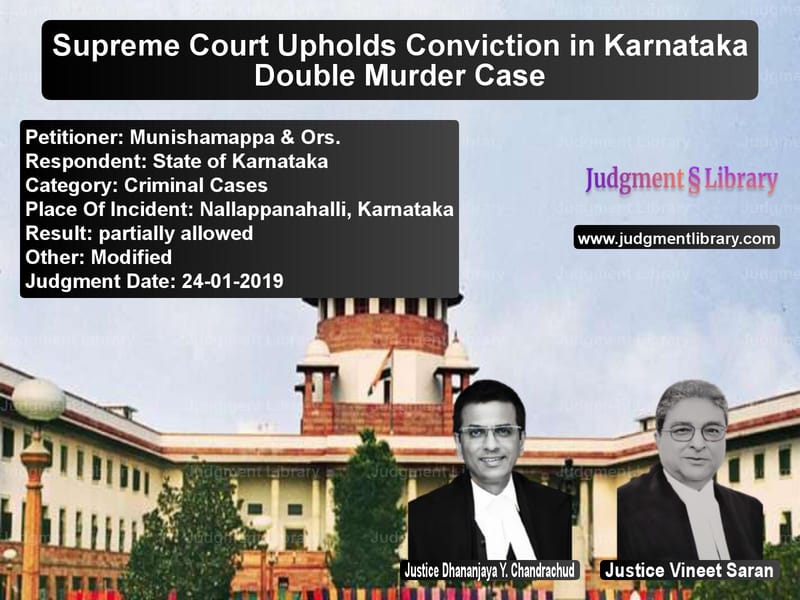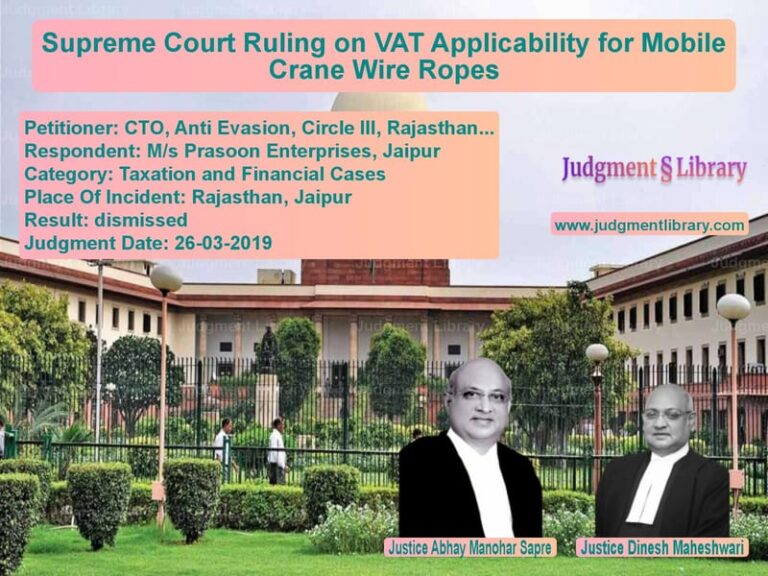Supreme Court Upholds Conviction in Karnataka Double Murder Case
The Supreme Court of India recently ruled in Munishamappa & Ors. vs. State of Karnataka, affirming the conviction of eight accused individuals under Section 304 Part I read with Section 149 of the Indian Penal Code (IPC). The case, stemming from a long-standing property dispute, involved the violent deaths of two individuals and severe injuries to several others. The Court upheld the Karnataka High Court’s decision, modifying the sentence to ten years rigorous imprisonment for the convicted individuals.
Background of the Case
The case revolved around a long-standing property dispute between two families in Nallappanahalli village, Karnataka. On March 15, 1995, during a land survey, an altercation occurred between members of the accused and the complainant’s families. The dispute escalated into a violent attack involving lethal weapons, including knives, cycle chains, and explosives. The attack resulted in the deaths of Kenchappa and Krishnappa, while multiple others sustained severe injuries.
The First Information Report (FIR) was lodged by Rani, the daughter of one of the deceased, at Malur Circle Police Station. The prosecution presented 25 witnesses, including multiple injured eyewitnesses, medical experts, and forensic analysts.
Trial Court Verdict
On October 31, 2003, the Principal Sessions Judge, Kolar, acquitted all eleven accused of charges under:
- Sections 143, 148, 323, 324, and 302 read with Section 149 of the IPC.
- Sections 3, 4, and 5 of the Explosive Substances Act, 1908.
The acquittal was primarily based on inconsistencies in witness testimonies and the prosecution’s failure to adequately explain the injuries sustained by some of the accused.
Karnataka High Court’s Decision
The State of Karnataka and the complainant appealed against the acquittal. On September 14, 2010, the Karnataka High Court partially overturned the acquittal, convicting ten of the accused under Section 304 Part I read with Section 149 IPC and sentencing them to seven years rigorous imprisonment.
The High Court observed:
- The accused returned armed with lethal weapons after an initial verbal altercation.
- Medical reports confirmed homicidal deaths due to serious injuries on vital organs.
- The prosecution had credibly established common object under Section 149 IPC.
- The trial court misinterpreted medical evidence and failed to properly assess witness credibility.
Appeal Before the Supreme Court
The convicted individuals appealed before the Supreme Court, while the complainant sought enhancement of the sentence from Section 304 Part I to Section 302 IPC.
Petitioners’ Arguments (Convicted Accused)
- The High Court improperly interfered with the trial court’s acquittal without strong justification.
- The accused sustained unexplained injuries, suggesting a two-sided fight.
- The trial court rightly concluded that the prosecution failed to establish a premeditated attack.
Respondents’ Arguments (State of Karnataka & Complainant)
- Evidence from injured eyewitnesses, supported by medical findings, corroborated the prosecution’s case.
- The accused arrived with weapons, demonstrating intent to cause harm.
- The trial court’s reliance on minor discrepancies in witness testimonies was erroneous.
Supreme Court’s Observations
The Supreme Court, comprising Justice Dhananjaya Y. Chandrachud and Justice Vineet Saran, ruled against the appellants, affirming the Karnataka High Court’s findings.
The Court held:
- “The evidence of multiple injured eyewitnesses cannot be disregarded.”
- “The accused returned armed after an earlier dispute, demonstrating a common object to attack.”
- “The presence of weapons, explosives, and the nature of injuries confirm the intention to cause serious harm.”
Regarding the applicability of Section 149 IPC, the Court ruled:
- “Section 149 establishes vicarious liability when an unlawful assembly acts in furtherance of a common object.”
- “All accused, even if not actively attacking, were part of an unlawful assembly with shared intent.”
Final Verdict
The Supreme Court modified the High Court’s ruling as follows:
- Conviction under Section 304 Part I read with Section 149 IPC was upheld.
- Sentence was enhanced from seven years to ten years rigorous imprisonment.
- Conviction under Section 324 read with Section 149 IPC was affirmed.
- Accused Nos. 10 and 12 were acquitted due to lack of consistent evidence.
Legal and Social Implications
- The ruling reinforces Section 149 IPC, ensuring that all participants in a violent act share responsibility.
- The judgment discourages organized violent retaliation arising from property disputes.
- The Court upheld the principle that injured eyewitness testimony carries high probative value.
This case sets an important precedent in criminal law, reinforcing the doctrine of common object liability under Section 149 IPC.
Petitioner Name: Munishamappa & Ors..Respondent Name: State of Karnataka.Judgment By: Justice Dhananjaya Y. Chandrachud, Justice Vineet Saran.Place Of Incident: Nallappanahalli, Karnataka.Judgment Date: 24-01-2019.
Don’t miss out on the full details! Download the complete judgment in PDF format below and gain valuable insights instantly!
Download Judgment: Munishamappa & Ors. vs State of Karnataka Supreme Court of India Judgment Dated 24-01-2019.pdf
Direct Downlaod Judgment: Direct downlaod this Judgment
See all petitions in Murder Cases
See all petitions in Attempt to Murder Cases
See all petitions in Judgment by Dhananjaya Y Chandrachud
See all petitions in Judgment by Vineet Saran
See all petitions in partially allowed
See all petitions in Modified
See all petitions in supreme court of India judgments January 2019
See all petitions in 2019 judgments
See all posts in Criminal Cases Category
See all allowed petitions in Criminal Cases Category
See all Dismissed petitions in Criminal Cases Category
See all partially allowed petitions in Criminal Cases Category







